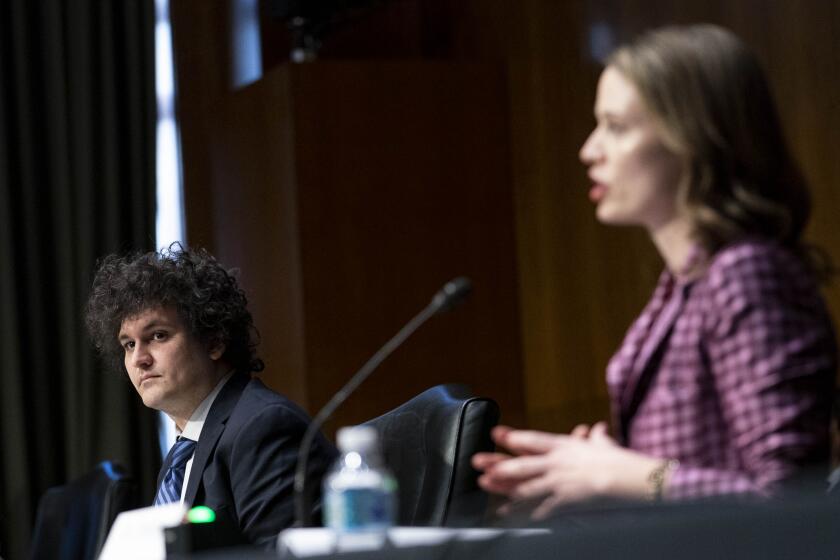Column: Thinking of putting crypto in your 401(k)? Think twice

- Share via
The federal government has some advice for workers contemplating adding bitcoin or another cryptocurrency to their retirement holdings: Don’t.
The advice is not exactly new. The Department of Labor, which oversees employer-sponsored retirement offerings such as 401(k) plans, first warned plan sponsors in March to “exercise extreme care” before opening those plans to cryptocurrency investments.
“These investments present significant risks and challenges to participants’ retirement accounts, including significant risks of fraud, theft and loss,” the agency said.
The industry is full of charismatic wunderkinds, opportunistic fraudsters and self-proclaimed investment advisors promoting financial products with little to no transparency.
— Democratic Sens. Elisabeth Warren, Dick Durbin and Tina Smith, in letter to Fidelity Investments
Since then, the hazards for investors in the cryptocurrency markets have only become more evident.
They’ve been underscored by the collapse earlier this month of FTX, a leading crypto exchange whose founder, Sam Bankman-Fried, had become the fresh-faced spokesman for the security of those markets and their potential to generate investment gains.
Get the latest from Michael Hiltzik
Commentary on economics and more from a Pulitzer Prize winner.
You may occasionally receive promotional content from the Los Angeles Times.
FTX filed for bankruptcy protection on Nov. 11, amid allegations of financial wrongdoing and evidence of spectacularly careless and chaotic internal operations. It was the second major player to file for bankruptcy in four months, following Celsius Networks, which also had been seen as a highflying and secure player in the field.
Celsius filed for bankruptcy on July 13, an abrupt collapse that has left an untold number of its 1.7 million customers financially devastated.
It isn’t clear whether these debacles will cool the efforts of investment promoters to entice average working men and women into the crypto Wild West.
Among the firms leading the charge has been Fidelity Investments, which administers retirement plans for about 35 million enrollees holding about $1.4 trillion in assets. Fidelity announced earlier this year that it would start allowing plan sponsors to offer their employees the option of investing in bitcoin.
This would-be crypto trillionaire promised to give away his wealth, but did he ever really mean it?
Is that a wise policy? Democratic Sens. Elizabeth Warren of Massachusetts, Dick Durbin of Illinois and Tina Smith of Minnesota don’t think so. In a Nov. 21 letter, they asked Fidelity to reconsider.
The implosion of FTX “made it abundantly clear the digital asset industry has serious problems,” they wrote. “The industry is full of charismatic wunderkinds, opportunistic fraudsters, and self-proclaimed investment advisors promoting financial products with little to no transparency.”
The lawmakers’ letter was a follow-up to one they sent on July 26, in which they termed Fidelity’s decision “immensely troubling.”
While the ultimate decision whether to allow workers to invest in bitcoin through their 401(k) plans rests with the employer sponsors of their plans, they wrote, “it seems ill-advised for one of the leading names in the world of finance to endorse the use of such a volatile, illiquid and speculative asset in 401(k) plans — which are supposed to be retirement savings vehicles defined by ... steady returns over time.”
Fidelity appears to be unmoved by such observations; instead it stands behind its own reputation for probity.
“Recent events in the digital assets industry have further underscored the importance of standards and safeguards,” a Fidelity spokesman told me by email. “As a firm that has been serving customers in financial markets for over 75 years, Fidelity has always prioritized operational excellence and customer protection across all of its businesses.”
Still, crypto is a uniquely perilous investment for families struggling to husband their resources for retirement.
Sam Bankman-Fried’s $16-billion fortune was always a myth. The mystery is why venture firms and the financial press thought it existed.
Defined contribution plans such as 401(k) plans have become the principal retirement offerings of most employers in recent decades, supplanting traditional defined benefit plans. The latter provide retirement stipends based on employees’ earnings and length of service at a company.
The retirement payments generated by defined contribution plans are dependent on the amounts that workers set aside as investments, plus whatever investment gains their funds produce over time.
There are virtues and drawbacks to both systems. Defined benefit plans are best for employees who stay with one employer for the long term. The risk of investment market downturns is borne by the employer, but typically they aren’t transferable to new employers.
Defined contribution plans are portable — they can follow workers as they move from company to company. But the workers carry the risks of market downturns.
Owners of 401(k) plans have seen these risks materialize in real time. The average balance in those plans fell in the third quarter of this year by 23% compared with a year earlier, according to Fidelity. An analysis by Vanguard, which runs neck and neck with Fidelity as a manager of defined contribution plans, showed that the average plan held about $129,000 at the end of 2021.
That’s misleading, however, because the average figure is pumped up by disproportionately lavish nest eggs held by richer workers. The median holding — the level that falls at the midpoint of assets owned by all account holders — was only about $33,500.
Those statistics illustrate the perils of making poor investment choices for one’s 401(k) plan. They explain why Fidelity’s initiative unnerved regulators at the Labor Department.
The agency didn’t issue a firm rule to govern defined contribution investments, in part because that would have required a lengthy period of analysis and public comment before it could be issued. Instead, the regulators issued a less formal advisory to plan fiduciaries — the corporate managers in charge of employee retirement options.
Column: Shame, suicide attempts, ‘financial death’ — the devastating toll of a crypto firm’s failure
Customers of the bankrupt Celsius reveal how the cryptocurrency firm’s collapse upended their lives.
Under federal law, the Labor Department said, “fiduciaries must act solely in the financial interests of plan participants and adhere to an exacting standard of professional care. ... Fiduciaries who breach those duties are personally liable for any losses to the plan resulting from that breach.”
The regulators identified five potential pitfalls in crypto investments that would weigh on whether offering the option was prudent. Crypto is “highly speculative” and its prices are exceptionally volatile, in part because of “the amount of fictitious trading reported, widely published incidents of theft and fraud, and other factors.” The market is complex and over-promoted as one with “unique potential for outsized profits.”
Record keeping was often sloppy and account security spotty, the regulators noted, and published valuations of cryptocurrencies unreliable. Finally, regulations and enforcement are still evolving, so it’s as yet unclear whether some crypto offerings are even legal.
All these issues have arisen in relation to FTX.
In effect, the Department of Labor put employers on notice that their decisions to allow workers to invest in crypto would be very carefully scrutinized.
At least through the end of October — prior to the FTX meltdown — crypto promoters pushed back energetically against the Department of Labor’s warning.
The most direct attack has come from ForUsAll, a Silicon Valley-based administrator of 401(k) plans for small businesses with a relatively modest $1.7 billion in assets under management. The firm offers 401(k) plans through which employers can allow their employees to invest limited sums in cryptocurrencies.
ForUsAll sued the Labor Department in federal court in Washington, D.C., in June, asserting that the agency’s crypto advisory violated federal rules requiring that such initiatives be subjected to public comment and other administrative procedures. But its main beef was that the agency was interfering with “the rights of American investors to choose how to invest money in their own retirement accounts.”
The agency, said ForUsAll Chief Executive Jeff Schulte in announcing the lawsuit, “plays several important roles that serve American workers — but “‘armchair financial advisor’ shouldn’t be one of them.” He accused the department of trying to “pick winners and losers” among asset classes.
The government asked the court to dismiss the lawsuit in October, arguing that the guidance didn’t fall into the category of rule making subject to the administrative requirements. ForUsAll subsequently offered to drop the case if the government agreed never to block cryptocurrency investment in retirement plans by considering it to be a violation of fiduciary standards, among other conditions. The government has rejected the firm’s conditions.
A cryptocurrency company thinks it will get a boost from putting its name on the Lakers’ arena. History begs to differ.
Also objecting to the Department of Labor’s advisory is the Crypto Council for Innovation, an alliance of cryptocurrency promoters including venture investors, crypto exchanges and Fidelity.
In a letter to the department dated June 14, the council complained that the advisory “in effect categorically precludes 401(k) administrators from including crypto investment options in their plans, based on a factually and legally flawed analysis.”
The council asserted that the advisory “narrowly considers only the risks of cryptocurrencies while disregarding their potential benefits, including growth and portfolio diversification.”
At least until the FTX collapse, crypto promoters were still assuming that public interest in the asset category was building, making it a promising area for business growth. There have been plenty of naysayers, to be sure. Among them is Jamie Dimon, CEO of the giant bank JP Morgan Chase & Co., who has consistently scoffed at bitcoin and other digital currencies. “They are decentralized Ponzi schemes, Dimon said in congressional testimony on Sept. 21. “And the notion that it’s good for anybody is unbelievable.”
It’s possible that news coverage of FTX’s collapse and revelations about its internal chaos will cure Americans of their fascination with the investment category.
Skepticism seems to be rising; one online sports betting firm, Bet Online, has begun to accept wagers on “the next crypto exchange to file for bankruptcy.” (The betting favorite in the pre-Thanksgiving period was Crypto.com, the exchange that has paid to place its name on the former Staples Center, the Los Angeles venue where the NBA Lakers and Clippers play.)
Or it’s possible that the prospect of quick riches will outweigh the dangers of putting one’s precious retirement nest egg with investment firms that play by their own rules, or no rules. Nothing can keep ordinary Americans from investing in any product, no matter how much evidence emerges of its sketchiness. But no one can say they haven’t been warned.
More to Read
Get the latest from Michael Hiltzik
Commentary on economics and more from a Pulitzer Prize winner.
You may occasionally receive promotional content from the Los Angeles Times.















